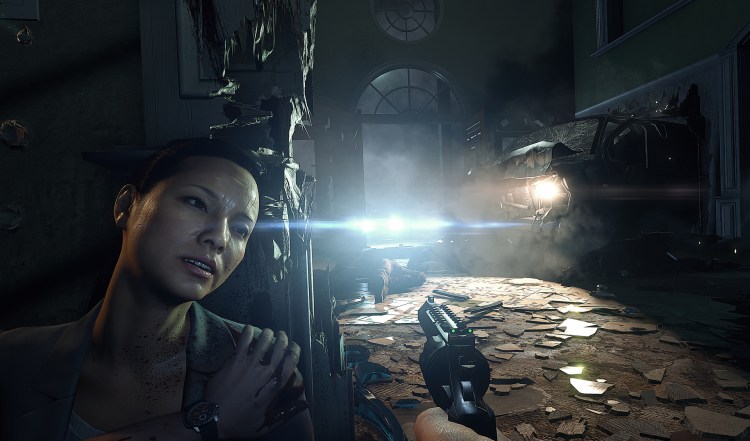Electronic Arts showed off the multiplayer version of Battlefield: Hardline this summer, but it has saved the description of the single-player campaign until now. The combat is true to EA’s Battlefield series, but the single-player game shows what happens when you apply that sort of fighting to the everyday street battles of cops and robbers.
And as a cop — even a street-hardened one — you can’t just go around shooting all of the suspects. So Battlefield Hardline’s creators added some interesting elements, like requiring you to hold a gun on a suspect — or face that prospect that the suspect will draw a gun on you. It’s even trickier when you’re facing two suspects in close quarters. Those are the types of situations that the game designers wanted to throw at players and make them sweat it out. You have to know when to use stealth, to go in flashing a badge, or to knock someone out from behind.
We previewed a couple of the levels of the single-player campaign and then interviewed creative director Ian Milham at Electronic Arts’ Visceral Games studio. Here’s our edited interview.
GamesBeat: Battlefield: Hardline departs from your typical shooter in a lot of ways. Can you talk about that?
Ian Milham: We thought that Battlefield at its heart is a multiplayer game and multiplayer stuff is awesome. We want to deliver that, first and foremost. But on the single-player side, we thought it was an opportunity to maybe expand things, change things up. Ultimately we’re delivering a different experience than the soldier shooting everything that comes on.
We thought we’d try a couple of cool new things. A lot more player choice, different ways to approach things. A lot more pacing variety. Being able to arrest and take down enemies instead of just shooting them. Sneaking and getting bounties and doing investigations.
GamesBeat: Stealth and rules of engagement are unusual here.
Milham: They’re not hardcore rules. It depends on how you play it. But we definitely wanted to get that feeling of a character who goes from cop to criminal. The gameplay reflects that.
GamesBeat: That’s been a big gap in the story up to now, this idea of going from cop to criminal.
Milham: Yes. There’s one character who experiences both sides.
GamesBeat: The character creation here — the female veteran and the new beat cop — what was some of the thinking behind these two particular characters?
Milham: We’re trying to tell an interesting story. Part of the player character’s identity is that he’s a — we wanted someone for whom being a cop meant something. Making him a Cuban immigrant, someone who appreciates the American dream, that seemed to have a lot of potential there. Finding out complications and all the things that can mean. And then his partner having a similar, parallel background, we thought that would be fun. It could give them perspective on issues on both sides of the law.
GamesBeat: When they go, in the beginning there, to capture the —
Milham: They’re really after [the main criminal]. They’re sort of working their way up the informant chain.
GamesBeat: You’re showing some of the dirty tactics involved in being a cop as well. You go and knock out people from behind. You’re not quite obeying the letter of the law.
Milham: Our goal was never to make a realistic police simulator. There’s no paperwork or any of that kind of stuff. We’re trying to make something more like a cop show. There’s definitely an element of “cops who don’t play by the rules!” That type of feeling. A little bit Miami Vice.
GamesBeat: You got some reaction at E3. Did you take any particular feedback in mind.
Milham: A ton. For E3, we went even beyond that, where we had not just the multiplayer on the floor, but the multiplayer beta. We had a ton of great feedback. Even our own experiences with that — you take it out to that many people, you learn a lot. One of my favorite parts about making a game is when you get to that point where even the game kind of tells you what it wants to be.
So yes, we’ve taken a ton of feedback from E3 and changed a bunch of things about the game. We’ve evolved and doubled down on other ideas and done a bunch of stuff that’s paid dividends in multiplayer.
GamesBeat: Some people reacted badly to the idea of shooting at cops or being a cop shooting at civilians. Is this simply not a game for those people? Is there some context to that?
Milham: When anybody plays it, they’ll see what we’re going for. Clearly, part of being a responsible creative person is understanding the context of the work you’re doing. Some of those issues have come to the forefront a lot more than we anticipated they would when we started the game, for sure. But I think anybody who plays it and sees it will see where we’re coming from. We’re doing something more like this cop-show vibe. Cops also don’t jump from tall skyscrapers with parachutes. It’s an exaggerated experience. This isn’t a game that’s making any sort of social comment in that area.



